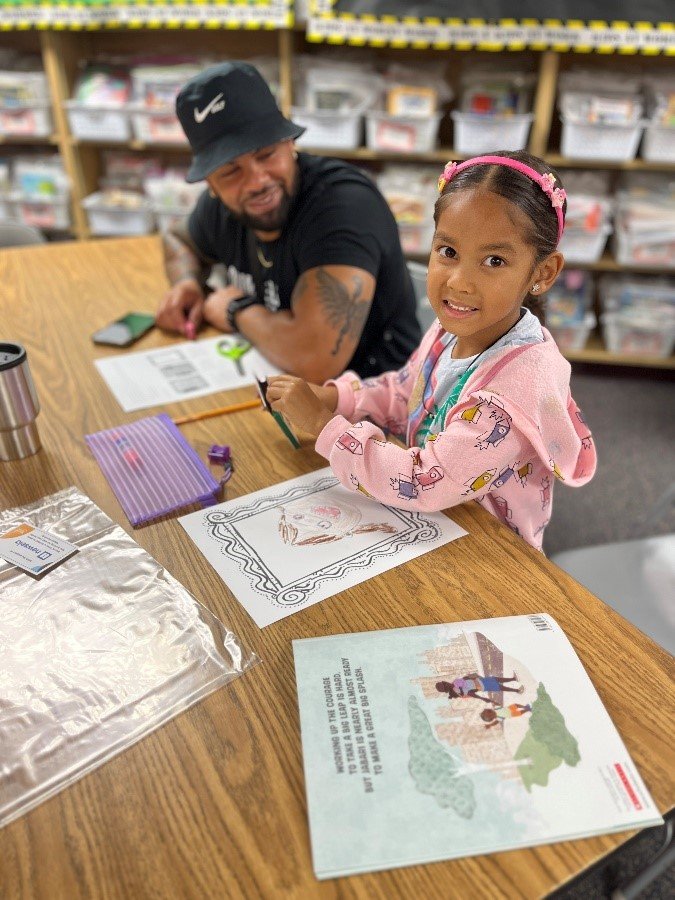By Melinda Cooper, Program Director
“I long, as does every human being, to be at home wherever I find myself. ”
You enter a room. It is empty. The walls are bare and there is no furniture. It is only you, wearing your clothes, with your feet on the cold, blank floor. You close your eyes and search for something – anything – to give you comfort. What, or who, do you think of?
Wherever your mind went, that is where you feel you belong. It is a special place, where you are safe to be yourself and to, simply, exist. To play, to thrive, to make mistakes, to learn from them, and to move through the world in your own unique way of being. This is what it means to belong.
Belonging is a fundamental human need; the longing for connection is universal.
The Family Literacy program at Encanto Elementary!
Recent studies have proven that a student’s sense of belonging has a positive effect on academic outcomes, achievement behaviors, and well-being, drawing strong correlations between the COVID-19 pandemic, students’ sense of belonging, and mental health. In fact, after controlling for pre-COVID depression and anxiety, researchers found that “students who reported a higher sense of belonging in the fall of 2019 had lower rates of depression and anxiety midst-COVID pandemic.” [1]
Others who have studied the effects of connectedness and belonging on low-income, urban, socially vulnerable adolescents have found that youth who feel more connected to their schools reported lower levels of depressive symptoms, suicidal ideation, and social anxiety as well as higher levels of self-esteem and a more adaptive use of their free time. [2]
At Words Alive, we know that it’s not enough to tell students to try to belong. We must help them learn how to cultivate belonging. One of the ways that we do this is by using anchor texts, selected to ground our yearly reading lists in a common theme, highlighting books and characters that speak to the lived experiences of the 5,000 kids and families with whom we work and co-create each year.
In our Family Literacy and Read Aloud programs, which collectively serve preschool through 3rd graders across the region, we will be reading titles such as:
• Mixed: A Colorful Story by Arree Chung
• All My Friends Are Planets by Troy Nelson
• The Very Impatient Caterpillar by Ross Burach
A book giveaway at Felicita Elementary
Our Adolescent Book Group participants will explore the Belonging Here theme through graphic novels, such as:
• The Magic Fish by Trung Le Nguyen
• Isla to Island by Natasha Donovan
• March: Book One by John Lewis & Andrew Aydin
Teens working on their crafts at Jackie Robinson YMCA
As students read fresh and relevant texts about characters who find connection and belonging within themselves and communities, they develop the ability to reflect on their own lives, while developing connections to each other and their worlds. Talking about the texts and reading aloud to one another builds their confidence and emotional awareness (while also developing their vocabulary and critical thinking).
When children and teens experience belonging, they are better able to cultivate trusting relationships, manage their emotions, and learn new skills while benefiting their cognitive and physical health. To facilitate this critical sense of belonging, young people need to be provided with opportunities for belonging and connection. This year, we plan to do just that.
To get involved, please visit https://www.wordsalive.org/becomeavolunteer.
References
Gopalan, M., Linden-Carmichael, A. Lanza, S. (2022). College Students’ Sense of Belonging and Mental Health Amidst the COVID-19 Pandemic, Journal of Adolescent Health, 70(2), 228-233. https://doi.org/10.1016/j.jadohealth.2021.10.010
Foster CE, Horwitz A, Thomas A, Opperman K, Gipson P, Burnside A, Stone DM, King CA. Connectedness to family, school, peers, and community in socially vulnerable adolescents. Children and Youth Services Review. 2017;81:321–331.
https://doi.org/10.1016/j.jadohealth.2021.10.010



